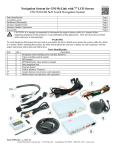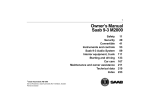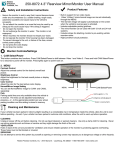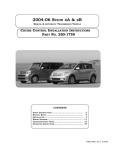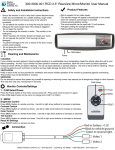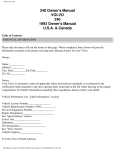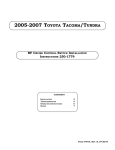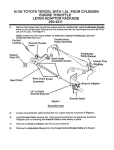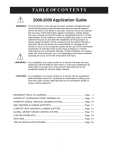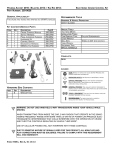Download Rostra World Cruisell Manual 2-2000
Transcript
WorldCruise ELECTRIC CRUISE CONTROL KIT# 250-1311 INSTALLATION & OWNER’S MANUAL CONTENTS Safety Procedures......................................... Helpful Hints................................................ Parts List...................................................... Parts Diagram............................................... Supplemental Parts....................................... Switch Settings............................................. Installation .................................................. Troubleshooting............................................. Operating Instructions.................................. 2 3 4 5 6 7 8 20 23 Form# 2976 Rev B 2/00 SAFETY PROCEDURES The WorldCruise is a microprocessor based Cruise Control. It is designed for ease of installation and can be used with most cars, light trucks and vans. Carefully follow the installation procedures in this manual for best results. DO NOT INSTALL THIS SYSTEM ON A DIESEL POWERED VEHICLE WHICH HAS A MANUAL TRANSMISSION WITHOUT A DISENGAGEMENT SWITCH (Kit# 250-4206) ON THE CLUTCH PEDAL ASSEMBLY. Your vehicle must have a VSS (Vehicle Speed Signal) wire or an available signal generator for installation of the WorldCruise. Please consult vendor’s application guide. Throughout the instructions there are WARNINGS, CAUTIONS, AND NOTES that are meant to make it easier for you to install the WorldCruise on your vehicle and make it safer to use. We have gathered these tips from people across the country who have informed us of their problems and solutions. Even with all these reports from the field, we cannot cover every condition which you might encounter, there are just too many different vehicle makes and models. We do our best to tell you how to handle most vehicles, but we must Depend on Your Good Judgement for dealing with the rest. Therefore, we believe you can understand why we strongly urge you to think carefully about what could happen to you, your passengers, and your vehicle if you use any tools, parts, fastening methods, routing or procedures which are not described in this manual. There is NO drain on the battery if the control switch is left on. The WorldCruise needs no regular service. WARNING Failure to follow the instruction manual could not only cause the WorldCruise to work improperly, but could cause the throttle to hang up, possibly causing damage to your vehicle and injury and/or death to you and your passengers. WARNING If you question the applications of the WorldCruise, please consult the applicable application guide. Only install on approved applications. The product described in this manual was developed, manufactured and tested in line with recognized technical standards and is in compliance with the fundamental safety requirements. Nevertheless, there are residual risks! It is therefore important to read this manual before installing and connecting the product. Keep the manual in a place that is readily accessible at all times. Throttle Adapter In order to cover certain vehicles with a universal cruise control, we have designed throttle adapters for performance and safety. Consult current Application Guides and Vehicle Technical Information Guides to see if your vehicle needs a Throttle Adapter before you install the WorldCruise. If an adapter is listed, it must be used with that application. Target Group and Qualified Installation This description is intended for those persons who install the product in the motor vehicle. In order to be able to operate properly, the WorldCruise must be correctly installed. The system may therefore be installed and wired by persons who know and have understood the installation instructions of this manual and are familiar with automotive electrical and mechanical systems. Installation by nonqualified personnel can lead to injury to the driver or third parties, or damage to property or the environment. Modifications to the product The WorldCruise is designed, manufactured and tested with due regard to safety and reliability. Modifying or tampering with the product can affect its safety. This can lead to death, serious or slight injury to the driver or third parties, or damage to property or the environment. For this reason, the product must not be modified or tampered with! Inform the user Hand the Operating Manual for the cruise to the user. The Operation Manual is an integral part of the product! If the cruise has not been fitted with a clutch switch, Please inform the user that the engine speed briefly increases when the function is switched off via the clutch. WARNING The information in this manual has been carefully compiled through actual vehicle testing and manufacturers service manual research and to the best of our ability is accurate. However, we do not warrant the accuracy of this information against changes in vehicle design, the use or misuse of this information or typographical errors. It is the responsibility of the installer to verify the signal and color on the wire attachments prior to and after the installation of the WorldCruise to assure proper operation. We do not accept any responsibility for damage to the vehicle or injury to its occupants caused by the use of this information. Improper installation and/or connection to the incorrect wires could cause WorldCruise or vehicle malfunction, component damage, and or personal injury for you and/or your passengers. Page 2 HELPFUL HINTS 1. BEFORE STARTING INSTALLATION: Familiarize yourself with the Installation Instructions and WorldCruise components. 2. MATING CONNECTORS: A. When disconnecting, hold connector and press the lock downward while pulling connectors apart. Figure A CAUTION Do not pull on wires. Figure A B. When inserting, push mating connectors together until locking mechanisms are firmly locked together. Figure B 3. AIRBAG AND ANTI-THEFT RADIO: A. If vehicle is equipped with an Anti-Theft Radio, the radio code must be written down prior to disconnecting battery cable. The code must be reentered when the negative battery cable is reinstalled. B. If vehicle is equipped with an Airbag (SRS), it is advisable to disconnect the negative battery cable. However, remember that some vehicles retain power to the airbag system when battery is disconnected. Figure B 4. REMOVAL OF NEGATIVE BATTERY CABLE: Disconnect the negative battery cable before installing the WorldCruise for safety precautions. Remember to reconnect the cable after installation. Figure C 5. ACCESSORY POWER: Figure C When installing the special terminal into the fuse panel of vehicle, See Figure D. WARNING Failure to follow the instruction manual could not only cause the WorldCruise to work improperly, but could cause the throttle to hang up, possibly causing damage to your vehicle and injury and/or death to you and your passengers. Figure D Page 3 PARTS LIST ITEM SERVICE PART # DESCRIPTION QTY A 250-3779 CRUISE MODULE 1 B 250-3695 CRUISE HARNESS 1 C 250-3607 CRUISE CABLE 1 D 250-3702 MODULE BRACKET 1 E 250-3700 CABLE BRACKET 1 F 250-3425 CONVOLUTED TUBING (58”) 1 G 250-3947 HARDWARE PACKAGE 1 1 2 3 4 5 6 7 8 9 10 11 12 13 14 15 16 17 18 19 20 21 22 2 4 1 2 2 1 1 1 1 1 10 1 1 1 1 1 1 2 2 1 1 1 MODULE BOLT SELF-THREADING BOLT (M6 X 19) BEAD CHAIN BEAD CHAIN CONNECTOR CONNECTOR COVER LOOP CABLE (67MM) LOOP CABLE (81MM) THREE BEAD CONNECTOR EYELET CONNECTOR TIE STRAP (102MM) TIE STRAP (190MM) TUBE CLAMP (10MM) FLAG NUT (THREADED TUBE CLAMP) M5 BOLT (M5-.8 X 10) M5 BOLT (M5-.8 X 20) M5 NUT LOCKNUT (NYLON INSERT, M5-.8) LOCKWASHER NUT (1/4-20) PLAIN WASHER SNAP-IN ADAPTER COTTER PIN (2MM X 16MM) SEALING PUTTY Use CLUTCH DISENGAGEMENT SWITCH (Kit# 250-4206) for manual transmission vehicle when the Dark Blue TACH wire cannot be obtained from vehicle or fails to disengage the WorldCruise. Service Parts are available to replace any part in this kit (See Service Part Numbers above). Additional Hardware is available on Page 6. Page 4 PARTS DIAGRAM WARNING Failure to follow the instruction manual could not only cause the WorldCruise to work improperly, but could cause the throttle to hang up, possibly causing damage to your vehicle And injury and/or death to you and your passengers. Page 5 SUPPLEMENTAL PARTS The following parts are available for your convenience and may simplify the installation of your WorldCruiuse. Contact your local dealer or ROSTRA representative for details. SERVICE PART # ITEM DESCRIPTION QTY A. LOOP CABLES A 250-2248 250-3089 250-2250 250-2249 250-2251 1.83” 2.62” 2.91” 3.20” 3.81” (47MM) (67MM) (74MM) (81MM) (97MM) 10 10 10 10 10 1.65” 2.74” 3.03” 3.53” 5.93” (42MM) (70MM) (77MM) (90MM) (151MM) 10 10 10 10 10 B. T-BAR ADAPTERS B 250-2252 250-2247 250-2253 250-2254 250-4248 C. STUD-CLIP CABLE W 250-2261 250-4255B 250-4242 250-2260 C 1.00” 1.25” 2.40” 2.80” (25MM) (32MM) (61MM) (71MM) 10 10 10 10 D. THROTTLE COUPLERS* 250-4291 250-4292 D M6 M8 10 10 3/16” (5MM) 1/4” (6MM) 5/16” (8MM) 3/8” (10MM) 1/2” (13MM) 10 10 10 10 10 E. TUBE CLAMPS 250-2255 250-2256 250-2257 250-2258 250-2259 MISCELLANEOUS F. G. E F 250-3440 250-2262 G GM™ HATCLIP 10 PEDAL BRACKET ASSEMBLY** 1 * The THROTTLE COUPLER Sets (250-4291 and 250-4292) come complete with THROTTLE COUPLER, STUD CAP and ELASTOMER RETAINER. ** The PEDAL BRACKET ASSEMBLY (250-2262) comes complete with a PEDAL BRACKET, a SELF-LOCKING PIN, an M5-.8 BOLT, an M5 NUT and two (2) PLAIN WASHERS. Page 6 X 12 SWITCH SETTINGS The CRUISE MODULE must be programmed for the vehicle on which it is installed. The twelve (12) programming switches must be set according to the chart below in order for the WorldCruise to operate properly. Figure 1 The twelve (12) programming switches are located under the Black rubber grommet on top of the CRUISE MODULE. NOTE 1: Both the VSS (Gray) and TACH (Dark Blue) wires must be connected. (If the Gray wire is not used, an auxiliary road speed source must be used.) See Page 18. NOTE 2: If using an “Open Circuit” control switch with the WorldCruise, Switch number seven (7) will have to be OFF. If you are unsure as to whether the control switch is “Open Circuit” or “Closed Circuit”, look at the label of the packaging in which the switch came, or See Page 22. NOTE 3: If any of the twelve (12) switches need to be changed after installation of the WorldCruise, the control switch and the vehicle ignition must be in the OFF position; this is to allow the WorldCruise to RESET. Figure 1 Figure 1 represents the twelve (12) programming switches for a vehicle characterized by: Switch (1 & 2) High Gain, Switch (3 , 4, 11 & 12) 4000 PPM, Switch (5 & 6) 4 Cylinder, Low, Switch (10) Square Wave Input, Switch (9) Manual Transmission Switch (8) High Set-Up Timer, and Switch (7) Closed Circuit Control Switch Page 7 INSTALLATION I. CRUISE MODULE MOUNTING NOTE DO NOT MOUNT THE CRUISE MODULE IN THE FOLLOWING AREAS: * * * * * * * * Under the fender. Under the vehicle. Directly to the engine. With the cable pointed down. Near sharp, hot or moving objects. Near ignition coil [No closer than 255mm (10”)]. In the passenger compartment (Noise). Where it will interfere with service checks. A. Select a possible location to mount your CRUISE MODULE, set the CRUISE MODULE unmounted in that area. The reason for leaving the CRUISE MODULE unmounted is to make sure the CRUISE HARNESS will reach the passenger compartment and the CRUISE CABLE will reach the throttle attaching point. Figure 2 B. Once you have selected a location, install the MODULE BRACKET to the bottom of the CRUISE MODULE with the two (2) MODULE BOLTS provided. It may be necessary to cut and bend the MODULE BRACKET to achieve a custom fit. Figure 2 NOTE DO NOT OVERTIGHTEN! DAMAGE TO THE CRUISE MODULE WILL OCCUR IF THE BOLTS ARE OVERTIGHTENED. C. Mount the CRUISE MODULE in the spot you have selected using two (2) of the SELF-THREADING BOLTS provided in the kit. Be sure to set the programming switches located underneath the rubber grommet on top of the CRUISE MODULE (See Page 7) before mounting the WorldCruise. Figure 3 Page 8 Figure 3 WARNING Failure to follow the instruction manual could not only cause the WorldCruise to work improperly, but could cause the throttle to hang up, possibly causing damage to your vehicle and injury and/or death to you and your passengers. INSTALLATION II. MEASURING THROTTLE CABLE TRAVEL THIS IS A VERY IMPORTANT STEP. FAILURE TO DETERMINE THROTTLE CABLE TRAVEL COULD CAUSE DAMAGE TO YOUR VEHICLE AND/OR WorldCruise. MEASURE ONLY WITH THE ENGINE OFF. The CRUISE CABLE moves 41mm (1-5/8”). To measure throttle travel, measure the distance from Position “A” (Idle) to Position “B” (Wide Open Throttle). Figure 4 A. Make a mark on the throttle cable when the throttle is in the idle position. Figure 4 B. Depress accelerator pedal and make a mark on the throttle cable when the throttle is in the wide open position. Figure 5 C. Measure the Distance “C” between the two marks. Figure 6 If the distance is greater than 41mm (1-5/8”), go to Page 9; If it is less, go to Step D. D. If the throttle travel is less than 41mm (1-5/8”), you must add length to the CRUISE CABLE to provide slack. Figure 5 NOTE: Slack is the distance the CRUISE CABLE moves before the throttle starts to move. E. Slide a CONNECTOR COVER on the throttle LOOP CABLE and on the CRUISE CABLE. Install a BEAD CHAIN CONNECTOR on the end of the LOOP CABLE and on the end of the CRUISE CABLE. The BEAD CHAIN CONNECTOR may need to be spread slightly for cable to enter. F. Install the end bead of the BEAD CHAIN in each BEAD CHAIN CONNECTOR with a bead (or beads) between them to add additional length. The beads inside the BEAD CHAIN CONNECTORS do not add length. Figure 6 NOTE: Each bead of the BEAD CHAIN added between the BEAD CHAIN CONNECTORS will give you 7mm (.28”) of slack. Example: If your throttle travels 35mm (1-3/8”), you will need to add one (1) bead between connectors. Figure 7 G. After the BEAD CHAIN is installed, lightly crimp the BEAD CHAIN CONNECTORS without pinching the cables and center the CONNECTOR COVERS over the BEAD CHAIN CONNECTORS. NOTE: You must always use the CONNECTOR COVERS. Figure 7 After determining your throttle cable travel, continue to Section III. WARNING Failure to follow the instruction manual could not only cause the WorldCruise to work improperly, but could cause the throttle to hang up, possibly causing damage to your vehicle and injury and/or death to you and your passengers. Page 9 INSTALLATION III. ATTACHING CRUISE CABLE TO THROTTLE This section will cover the proper ways to use the hardware available. Each method contains sample illustrations showing how the connector is used in an actual installation. It must be noted, however, that you should have an understanding of how each attachment method works so that a proper installation is achieved. There are five (5) different types of throttle connections. A. Pulley Assembly Using The LOOP CABLE B. Pulley Assembly Using T-BAR ADAPTER (See Page 6) C. Pedal Attachment. D. Ford™ Throttle E. General Motors™ and Chrysler™ Throttle Using THREE BEAD CONNECTOR NOTE When using the BEAD CHAIN CONNECTOR to connect the BEAD CHAIN to the CRUISE CABLE you must always use the CONNECTOR COVER. Figure 8 Failure to use the CONNECTOR COVER could possibly cause the BEAD CHAIN or CRUISE CABLE to hang in the BEAD CHAIN CONNECTOR causing the throttle to be held in a partially open position. This condition may even occur when the cruise control is not being used. Figure 8 A. Pulley Assembly Using The LOOP CABLE 1. On some vehicles it may be necessary to remove the air cleaner to access the throttle pulley segment. 2. Set the pulley segment in an OPEN throttle position, and remove the throttle cable from the pulley. 3. Hold the LOOP CABLE between the holes in each side of the pulley. Slide the barrel at the end of the throttle cable through the slotted hole, then through the LOOP CABLE and into the second hole. Figure 9 4. Connect the LOOP CABLE to the CRUISE CABLE using the BEAD CHAIN CONNECTOR as follows: Slide a CONNECTOR COVER on the LOOP CABLE. Install a BEAD CHAIN CONNECTOR onto the LOOP CABLE and then onto the CRUISE CABLE. BEAD CHAIN CONNECTOR may need to be spread slightly for cables to enter. After the BEAD CHAIN CONNECTOR is installed, lightly crimp the connector without pinching the cables. Then slide the CONNECTOR COVER over the center of the BEAD CHAIN CONNECTOR. Figure 9 NOTE You must always use the CONNECTOR COVER. Failure to do so could possibly cause the LOOP CABLE or the CRUISE CABLE to hang in the BEAD CHAIN CONNECTOR causing the throttle to be held in a partially open position. 5. To secure the LOOP CABLE to the throttle cable, punch a small hole in the CONNECTOR COVER and slide the TIE STRAP (102MM) through the hole and secure to the throttle cable. Figure 10 NOTE: Firmly tighten the TIE STRAP (102MM) and remove excess to prevent possible throttle interference. Page 10 Figure 10 WARNING If the LOOP CABLE is not secured to the existing throttle cable, it could come out of the pulley segment possibly causing the throttle to be held in a partially open position. INSTALLATION III. ATTACHING CRUISE CABLE TO THROTTLE (Continued) B. Pulley Assembly (Dual) Using The T-BAR ADAPTER 1. Remove air cleaner to expose the dual pulley segments. 2. Find the blank anchor that is located above the throttle anchor. Follow the instructions for anchoring the CRUISE CABLE, See Page 14. 3. Attach a BEAD CHAIN CONNECTOR onto the CRUISE CABLE. Figure 11 4. Attach the T-BAR ADAPTER to the top pulley segment. Slide the CONNECTOR COVER onto the T-BAR ADAPTER. 5. Attach the T-BAR ADAPTER to the BEAD CHAIN CONNECTOR Make sure to slide the CONNECTOR COVER over the BEAD CHAIN CONNECTOR. Figure 12 Figure 11 C. Pedal Attachment 1. Select a TUBE CLAMP that fits around the top of the accelerator pedal shaft. Make sure the tabs of the TUBE CLAMP point away from the bulkhead. 2. Attach the BEAD CHAIN to the CRUISE CABLE with a BEAD CHAIN CONNECTOR. Make sure to use a CONNECTOR COVER. 3. After you determine the length of BEAD CHAIN needed to attach to the accelerator pedal shaft, cut BEAD CHAIN and attach to the EYELET CONNECTOR. Make sure to use a CONNECTOR COVER. 4. Put M5 BOLT through the holes in the TUBE CLAMP. Slide the EYELET CONNECTOR over the bolt. Thread LOCKNUT onto the bolt and tighten. Figure 13 WARNING Failure to follow the instruction manual could not only cause the WorldCruise to work improperly, but could cause the throttle to hang up, possibly causing damage to your vehicle and injury and/or death to you and your passengers. Figure 12 Figure 13 Page 11 INSTALLATION III. ATTACHING CRUISE CABLE TO THROTTLE (Continued) D. Ford™ Throttle 1. Select a TUBE CLAMP that fits the throttle cable. Make sure the tabs of the TUBE CLAMP point away from the carburetor or air throttle, this will prevent the throttle from hanging. Figure 14 2. Attach CRUISE CABLE to the EYELET CONNECTOR. NOTE: Use the CONNECTOR COVER. 3. Put the M5 BOLT through the holes in the TUBE CLAMP. Slide the EYELET CONNECTOR over the bolt. Thread the LOCKNUT onto the bolt and tighten. Figure 14 4. Figure 15 is an example of a Ford™ Throttle connection using the TUBE CLAMP. Figure 14 Figure 15 E. General Motors™ and Chrysler™ Throttle using THREE BEAD CONNECTOR. 1. Most General Motors™ vehicles and many Chrysler™ vehicles can use the THREE BEAD CONNECTOR to attach the CRUISE CABLE. Figure 16 WARNING Failure to follow the instruction manual could not only cause the WorldCruise to work improperly, but could cause the throttle to hang up, possibly causing damage to your vehicle and injury and/or death to you and your passengers. Page 12 Figure 16 INSTALLATION III. ATTACHING CRUISE CABLE TO THROTTLE (Continued) E. General Motors™ and Chrysler™ Throttle using THREE BEAD CONNECTOR. (Continued) 2. Attach the BEAD CHAIN to the THREE BEAD CONNECTOR. Secure beads by folding the metal tabs. Figure 17 3. Remove clip or pin which retains throttle cable (and washer if provided) and install THREE BEAD CONNECTOR on the same side of throttle cable that the CRUISE CABLE will be anchored (this is necessary so that CRUISE CABLE and throttle cable will not cross). 4. The THREE BEAD CONNECTOR may need to be bent so that it clears the throttle cable. Figure 18 Use the TIE STRAP (102MM) to hold the THREE BEAD CONNECTOR to the sleeve of the throttle cable. Figure 18 Figure 17 5. When the THREE BEAD CONNECTOR is properly used, the following parts will be required: THREE BEAD CONNECTOR CONNECTOR COVER BEAD CHAIN CONNECTOR BEAD CHAIN See Figure 19 Figure 18 NOTE After the CRUISE CABLE has been attached, manually move the throttle to assure the CRUISE CABLE does not hang up on any part of the vehicle. WARNING Failure to follow the instruction manual could not only cause the WorldCruise to work improperly, but could cause the throttle to hang up, possibly causing damage to your vehicle and injury and/or death to you and your passengers. Figure 19 Page 13 INSTALLATION IV. ANCHORING CRUISE CABLE There are three (3) types of connectors used to anchor the CRUISE CABLE: A. SNAP-IN ADAPTER B. General Motors™ Blank Anchor C. FLAG NUT A. SNAP-IN ADAPTER 1. Before using the SNAP-IN ADAPTER, remove the Adjustable Sleeve from the CRUISE CABLE. To use the SNAP-IN ADAPTER, it will be necessary to form threads on the end of the CRUISE CABLE. This is easily accomplished by placing the LOCKWASHER NUT on the end of the CRUISE CABLE with your fingers. Then using an 11mm box end wrench and turning clockwise until the desired amount of threads have been formed. Figure 20 2. After the threads have been formed, screw the SNAP-IN ADAPTER onto the CRUISE CABLE. Figure 21 Figure 20 Figure 21 NOTE Insulation on the CRUISE CABLE must extend past the end of the SNAP-IN ADAPTER on all applications. 3. The SNAP-IN ADAPTER snaps into the square hole of the CABLE BRACKET Figure 22 or snaps into an existing square hole on the vehicle (common on GM™ vehicles). Figure 23 Figure 22 WARNING Failure to follow the instruction manual could not only cause the WorldCruise to work improperly, but could cause the throttle to hang up, possibly causing damage to your vehicle and injury and/or death to you and your passengers. Page 14 Figure 23 INSTALLATION IV. ANCHORING CRUISE CABLE (CONTINUED) B. General Motors™ Blank Anchor 1. To locate the blank anchor on General Motors™ vehicles, it is necessary to remove the air cleaner. The blank anchor is located above the throttle anchor. Figure 24 2. This anchor is hollow except at one end. Use a 6.4mm (.25”) bit drill as shown in Figure 24. 3. Before using the LOCKWASHER NUT, remove the Adjustable sleeve from the CRUISE CABLE. Then use the LOCKWASHER NUT to form threads on the end of the CRUISE CABLE. This is easily accomplished by placing the LOCKWASHER NUT on the end of the CRUISE CABLE with your fingers. Then use an 11mm box end wrench and turn clockwise until the desired amount of threads have been formed. Figure 20, Page 14 Figure 25 4. Insert the CRUISE CABLE through the blank anchor and thread the other LOCKWASHER NUT in place. Figure 25 NOTE If you do not use the other LOCKWASHER NUT, install a TUBE CLAMP 152mm-178mm from the anchor point. Figure 26 This will keep the CRUISE CABLE from backing out of the anchor. 5. The LOCKWASHER NUT can also be used if there is a pre-existing 6.4mm hole in a bracket on the vehicle or if it is possible to drill a 6.4mm hole in a bracket on the vehicle. Figure 26 WARNING Failure to follow the instruction manual could not only cause the WorldCruise to work improperly, but could cause the throttle to hang up, possibly causing damage to your vehicle and injury and/or death to you and your passengers. Figure 27 Page 15 INSTALLATION IV. ANCHORING CRUISE CABLE (CONTINUED) CAUTION When using the FLAG NUT on the CRUISE CABLE the Adjustable Sleeve MUST be REMOVED. When using a TUBE CLAMP on the CRUISE CABLE the adjustable sleeve MUST be USED to prevent slippage or binding of cable. C. FLAG NUT Figure 28 1. Before using the FLAG NUT, it will be necessary to form threads on the end of the CRUISE CABLE. This is easily accomplished by placing the LOCKWASHER NUT on the end of the CRUISE CABLE with your fingers. Then use an 11mm box end wrench and turn clockwise until the desired amount of threads have been formed. Figure 20, Page 14 2. After the threads have been formed, screw the FLAG NUT onto the CRUISE CABLE. Figure 28 3. The FLAG NUT may be used to anchor the CRUISE CABLE to the existing throttle cable bracket. Figure 29 In some cases there is an existing hole, in other cases you can drill a 5mm (.20”) hole in the bracket. Figure 29 4. The FLAG NUT may also be used to anchor the CRUISE CABLE using the CABLE BRACKET. Figure 30 Figure 30 WARNING Failure to follow the instruction manual could not only cause the WorldCruise to work improperly, but could cause the throttle to hang up, possibly causing damage to your vehicle and injury and/or death to you and your passengers. Page 16 INSTALLATION V. CRUISE HARNESS A. Push Rubber Grommet securely into place on the cover of the CRUISE MODULE. Figure 31 B. Straighten the CRUISE HARNESS and find the 2- & 4-pin mating connectors. Seperate the 2- & 4-pin connectors. A small screwdriver may be needed (See K in Figure 34). C. CRUISE HARNESS needs a 19mm (.75”) hole to pass through bulkhead. You may find one nearby, such as the speedometer cable hole or a small one you can file larger. If you find the right size hole in the right place, remove vehicle grommet. If not, drill, saw, or punch a 19mm hole in bulkhead. A hole a few millimeters to the left or slightly higher than the steering column is usually a good place. Figure 32 NOTE Check inside before drilling, sawing, or filing so you don’t damage anything. Black Figure 31 D. From engine side, pass the 2- & 4-pin connectors through hole. If you do not hook up the Dark Blue TACH wire and the Gray VSS wire under the hood, pass them through to the inside of the vehicle, also. E. Reattach the 2- & 4-pin mating connectors and make the necessary wire connections. (See Page 18 for wiring instructions) VI. SEALING BULKHEAD Seal hole in bulkhead with SEALING PUTTY as shown in Figure 32. VII. CONTROL SWITCH INSTALLATION If your cruise control switch is the type which clamps on the turn signal lever, requires cutting the turn signal lever, or is mounted on the instrument panel, follow the instructions packaged with it. If you have a switch which replaces the complete original equipment turn signal lever, remove the existing lever and install the cruise control switch and lever assembly as instructed in the vehicle shop service manual. Figure 32 WARNING Failure to follow the instruction manual could not only cause the WorldCruise to work improperly, but could cause the throttle to hang up, possibly causing damage to your vehicle and injury and/or death to you and your passengers. Figure 33 Page 17 INSTALLATION VIII. WIRING ATTACHMENTS TO VEHICLE CAUTION Utilize Figure 34 to make the necessary wiring harness connections to your vehicle. Before making any wiring connections, be sure to disconnect your vehicle’s negative battery cable to avoid electrical shock and/or damage to the the vehicle’s electrical system. Figure 34 A. Black Ground Wire In order to find a good ground for the cruise system, find a vehicle ground point which is a clean unpainted metal surface. If the cruise control does not “see” ground at all times, it will not function. NOTE: Do not use the engine as a grounding point. Do not use the cable bracket as a gounding point. NOTE: To find a place to get electrical power you will need to ground one lead of your test light or volt-ohmmeter. Find electrical ground by turning ON the ignition switch and touching one lead to a “Hot” fused terminal at fuse panel; touch other lead to unpainted metal part of vehicle. The metal you touch, if it makes continuity, is ground. The bracket for the parking brake lever is usually a good ground. Turn the ignition OFF. B. Brown Accessory Power Find a fuse at the fuse panel that supplies power to one of the vehicles accessories. It should be +12 volts when the key is ON and zero (0) volts when the key is OFF or in the START (CRANK) position. C. Red Brake Positive “Hot” side of brake switch: Use the wire at the brake switch connector with constant +12 volts D. Violet Brake Negative “Cold” side of brake switch: Use the wire at the brake switch connector with zero (0) resistance when brake is not pressed, and +12 volts or open resistance when brake is pressed. E. Dark Blue Tachometer (TACH) Wire The TACH function is a safety feature of the WorldCruise. If a vehicle with an automatic transmission is accidentally “knocked” into neutral while the vehicle is in motion and the WorldCruise is active, the TACH wire, when connected, will disengage the WorldCruise before engine over-rev. If the TACH wire is not “hooked-up”, the cruise control will function; however the TACH over-rev safety feature will be inactive; this is dangerous and not recommended. ROSTRA PRECISION CONTROLS, INC. always recommends the attachment of the TACH wire. Page 18 INSTALLATION E. Dark Blue Tachometer (TACH) Wire (CONTINUED) On a vehicle with a manual transmission, the TACH wire connection is not required only when CLUTCH DISENGAGEMENT SWITCH (Kit# 250-4206) has been installed; this will take into acount the TACH over-rev safety feature. The TACH wire should be grounded when using a clutch disengagement switch to ensure that the wire does not introduce “trashy” signals into the system. In order to locate the TACH signal, consult a Vehicle Shop Manual, our Vehicle Technical Guide (ROSTRA Form# 2482), try our Fax-Back System at (910) 610-4191, call our Technical Service Department at (910) 277-1828, Fax us at (910) 276-3759 (USA) or visit us on the web at www.rostra.com. F. Gray Vehicle Speed Sensor (VSS) Wire The Gray Vehicle Speed Signal (VSS) wire is how the WorldCruise “knows” how fast the vehicle is moving. The Pulses Per Mile/Kilometer (PPM/PPK) are a characteristic of the vehicle and must be set accordingly (See Page 7). If VSS cannot be located on the vehicle then an auxiliary road speed sensor must be used [SIGNAL GENERATOR or MAGNET & COIL PICK-UP KIT (KIT# 250-4165)]. If you use an auxiliary speed sensor, plug it into auxiliary speed sensor connector (G in Figure 34) and trim the Gray VSS wire as not to pick-up any stray signals. In order to locate the VSS signal, consult a Vehicle Shop Manual, our Vehicle Technical Guide (ROSTRA Form# 2482), try our Fax-Back System at (910) 610-4191, call our Technical Service Department at (910) 277-1828, Fax us at (910) 276-3759 (USA) or visit us on the web at www.rostra.com. G. Auxiliary Speed Sensor Connector This connector is utilized when the Gray VSS wire is not used as the vehicle speed source. Both ROSTRA [SIGNAL GENERATOR and MAGNET & COIL PICK-UP KIT (KIT# 250-4165)] have a mating connector which plugs right into the wiring harness. H. 4-Pin Switch Connector This connector is utilized by the control switch. All ROSTRA control switches contain a mating connector which plugs right into the main wiring harness. J. 2-Pin Switch Connector This connector is used in conjunction with the 4-Pin Switch Connector (H in Figure 34). The 2-Pin Switch Connector (J in Figure 34) is utilized by control switches which require an additional power and ground source such as those containing an LED indicator light or ROSTRA Radio Frequency (RF) models. K. Bulkhead Connectors These connectors simplify the installation of the wiring harness through the engine bulkhead (firewall). Simply disconnect the connectors, run them through any 19mm (.75”) hole in the firewall (preferably near the steering column), and reconnect them once inside the passenger compartment. WARNING Failure to follow the instruction manual could not only cause the WorldCruise to work improperly, but could cause the throttle to hang up, possibly causing damage to your vehicle and injury and/or death to you and your passengers. Page 19 TROUBLESHOOTING IX. SELF DIAGNOSTIC TESTING PROCEDURE The WorldCruise is equipped with a Self Diagnostic Light Emitting Diode (LED) located underneath the rubber grommet on top of the CRUSE MODULE. Utilize the following Self Diagnostic Procedure to troubleshoot your cruise control if it does not function properly once installed. DIAGNOSTIC LED The twelve (12) programming switches and diagnostic LED are located under the Black rubber grommet on top of the CRUISE MODULE. FIGURE 35 Carefully follow the procedures below to enter your cruise control into Self Diagnostic Mode. Step 1: Turn the cruise control switch OFF. Step 2: Turn the ignition to the OFF position. Step 3 Closed Circuit Control Switch (See Page 22): Press and hold the RESUME/ACCEL button while you turn the ignition switch to the ON position without starting the engine. Now release the the RESUME/ACCEL slide switch. Open Circuit Control Switch (See Page 22): Turn the ignition switch to the ON position without starting the engine, hold the RESUME/ACCEL button down while you turn the cruise control switch to the ON position. Step 4: The Diagnostic LED should be OFF at this time. You are now in Self Diagnostic Mode. Continue to follow the procedures below to test your cruise control switch, brake switch connections and VSS signal. Step 5: Press and Release the SET/COAST button. The LED should light each time the button is pressed and go out when it is released. If so, continue to Step 6; if not, go to Step 5a. a. Check steps to entering Diagnostic Mode and test again. b. Check Programming Switch# 12. It should be ON for a Normally Closed Circuit Control Switch and OFF for a Normally Open Circuit Control Switch. (See Page 22): If set incorrectly, reset and reenter Diagnostic Mode. c. Check power to the CRUISE MODULE if none of the diagnostic commands are functioning. d. Check Cruise Control Switch (See Page 22). Step 6: Press and release the RESUME/ACCEL button. The LED should light each time the button is pressed and go out when it is released. If so, continue to Step 7; if not, go to Step 6a. a. Check steps to entering Diagnostic Mode and test again. b. Check power to the CRUISE MODULE if none of the diagnostic commands are functioning. c. Check Cruise Control Switch (See Page 22). Step 7: You will need a second person to help you perform this test. Press and release the Brake Pedal. The LED should light each time the brake is pressed and go out when it is released. If so, continue to Step 8; if not, go to Step 7a. a. Check steps to entering Diagnostic Mode and test again. b. Check power to the Red Brake Positive wire. c. Check power to the CRUISE MODULE if none of the diagnostic commands are functioning. d. Check Brake Switch Connector and wiring to brake switch. Step 8: a. Vehicle’s own computer as VSS source: Roll the vehicle at least two (2) meters forward or backward, the LED should flash and continue to flash at the same rate. If so, continue to Step 9; if not, go to Step 8ai. i. Check steps to entering Diagnostic Mode and test again. ii. Check Programming Switch# 10. It should be ON for Square Wave Input. If set incorrectly, reset and reenter Diagnostic Mode. iii. Some vehicles need to be pushed more than two (2) meters. In that case, raise one (1) of the vehicle drive wheels (both drive wheels on a limited slip differential) and block the non drive wheels. Use a support stand for safety. Spin the drive wheel by hand as fast as possible. The LED should flash and continue to flash at the same rate. If so, continue to Step 9; if not, go to Step 8aiv. iv. Either your VSS wire is incorrect or your connection is bad. Inpect your VSS connection and reenter Self Diagnostic Mode. Page 20 TROUBLESHOOTING b. Auxiliary Speed Sensor ([SIGNAL GENERATOR or MAGNET & COIL PICK-UP KIT (KIT# 250-4165)] Raise one (1) of the vehicle drive wheels (both drive wheels on a limited slip differential) and block the non drive wheels. Use a support stand for safety. Spin the drive wheel by hand as fast as possible (You must spin the wheel at least 4.8 KPH (3 MPH) or faster in order to test an auxiliary speed signal.) The LED should flash and continue to flash at the same rate. If so, continue to Step 9; if not, go to Step 8bi. i. Check steps to entering Diagnostic Mode and test again. ii. Check Programming Switch# 10. It should be OFF for Sine Wave Input. If set incorrectly, reset and reenter Diagnostic Mode. Step 9: Your WorldCruise has successfully passed the Self Diagnostic Testing Procedure. If it still does not function, test your TACH signal. X. TACH SIGNAL TESTING PROCEDURE Step 1: Turn the cruise control switch OFF. Step 2: Turn the ignition to the OFF position. Step 3 Closed Circuit Control Switch (See Page 22): Press and hold the RESUME/ACCEL button while you turn the ignition switch to the ON position and start the engine. Now release the the RESUME/ACCEL slide switch. Open Circuit Control Switch (See Page 22): Turn the ignition switch to the ON position and start the engine, hold the RESUME/ACCEL button down while you turn the cruise control switch to the ON position. Step 4: The Diagnostic LED should be flashing. Rev the engine, the LED should flash faster at higher RPM’s. If so, your TACH signal is valid, if not, go to Step 4a. a. Check steps to entering Diagnostic Mode and test again. b. Either your TACH wire is incorrect or your connection is bad. Inspect your TACH connection and reenter Self Diagnostic Mode. General Wiring Diagram WorldCruise System Figure 36 Page 21 TROUBLESHOOTING XI. CONTROL SWITCH TESTING PROCEDURE Utilize the following continuity charts to test your control switch if you suspect that it is not functioning properly. You need to unplug the 8-pin connector from the CRUISE MODULE to perform these tests. 1. Ground the test light lead and verify that the light works by probing a known power source. 2. Follow the test charts below using the appropriate chart for your control switch. Your control switch is a Closed Circuit Control Switch if: 1. Its ROSTRA part number is 250-3002, 250-3018, 250-3020, 250-3021, 250-3026, 250-3032, 250-3084, 250-3091, 250- 3100, 250-3120, 250-3125, 250-3126, 250-3127, 250-3133, 250-3167, 250-3168, 250-3169, 250-3175, 250-3180, 250-3194, 250-3304, 250-3328, 250-3421, 250-3446 OR 2. You must push the control button to the left for the RESUME/ACCEL function. Your control switch is an Open Circuit Control Switch if: 1. Its ROSTRA part number is 250-3357, 250-3358, 250-3443, 250-3444, 250-3592, 250-3593, 250-3632, 250-3633, 250-3594, 250-3595, 250-3742, 250-3743. OR 2. You must push the control button to the right for the RESUME/ACCEL function. OR 3. It has a Green LED Indicator Light. OR 4. It is a ROSTRA Radio Frequency (RF) control switch. The CRANK or START IGNITION SWITCH POSITION refers to the momentary state when the key starts the engine just before it returns to the RUN IGNITION SWITCH POSITION. Page 22 OPERATING INSTRUCTIONS XII. WorldCruise OPERATING INSTRUCTIONS ON: To operate the WorldCruise, turn the power button ON. (Green LED Indicator will light, if equipped.) Wait three (3) seconds before setting speed. SET SPEED: To engage system, drive at any speed above 50 KPH (33 MPH), press SET/COAST or press RESUME/ACCEL and release, then remove your foot from the accelerator pedal. Automatic control will be at the speed of the vehicle when the button is released plus or minus 3 KPH (1-1/2 MPH) Press accelerator and speed will increase, release accelerator and you will return to set speed. NOTE: The RESUME/ACCEL button will SET the WorldCruise without pressing the SET button first. COAST: Press and Hold the SET/COAST button and your speed will decrease. Release button and speed of vehicle at time button is released will be new set speed if above 50 KPH (33 MPH). ACCEL: Press and hold the RESUME/ACCEL button and your speed will increase. Release button and you will have a new higher set speed. TAP-UP: You can gradually increase your speed by quickly pressing and releasing the RESUME/ ACCEL button. Each time you press and release the button your speed will increase by 1-1/2 to 5 KPH (2 to 3 MPH). TAP-DOWN: You can gradually decrease your speed by quickly pressing and releasing the SET/COAST button. Each time you press and release the button your speed will decrease by 1-1/2 to 5 KPH (2 to 3 MPH). DISENGAGE: Depress brake pedal slightly; automatic speed control will cease but set speed will stay in the system’s memory. Also, you can disengage by pressing button to OFF position, but this erases the memory. To get the RESUME feature to work again, you must first set a speed. Turning OFF the ignition also clears the system’s memory. RESUME: After disengaging system with brake or clutch, return to SET speed by driving above 50 KPH (33 MPH). Then press RESUME/ACCEL button and release it. If acceleration rate is faster or slower than you like, drive to within a few KPH (MPH) of your set speed, then press and release the RESUME/ACCEL button. THINGS YOU SHOULD KNOW ABOUT YOUR WorldCruise The performance of the WorldCruise is dependent upon the condition of the engine, its size and even by the type of emission control equipment it has. Driving at higher altitudes will have an effect on WorldCruise performance. Under normal conditions and with proper switch settings, speed should be controlled within plus or minus 3 KPH (1-1/2 MPH). There may be situations; however, which make it seem as if the WorldCruise is not capable of functioning accurately, such as an extra heavy load, a very steep hill, or a severe headwind. CAUTION: Do not use the WorldCruise on a slippery road nor in heavy traffic. CAUTION: (Manual Transmission) While driving with the WorldCruise ON, do not shift to neutral without depressing the clutch pedal, as this may cause engine racing or overreving. If this happens, depress the clutch pedal or turn OFF the main Cruise Control Switch immediately. OUR QUALIFIED EXPERT TECHNICAL SERVICE DEPARTMENT IS READY TO ASSIST YOU WITH ANY QUESTIONS OR PROBLEMS THAT YOU MAY HAVE ABOUT OUR PRODUCT. CONTACT US VIA PHONE AT (910) 277-1828 (USA) OR FAX AT (910) 276-3759 (USA). Page 23 Rostra Precision Controls, Inc. Global Automotive Accessories Group 2519 Dana Drive Laurinburg, NC 28352-4000 www.rostra.com Certified QS 9000/ISO 9001 Made in the U.S.A.



























